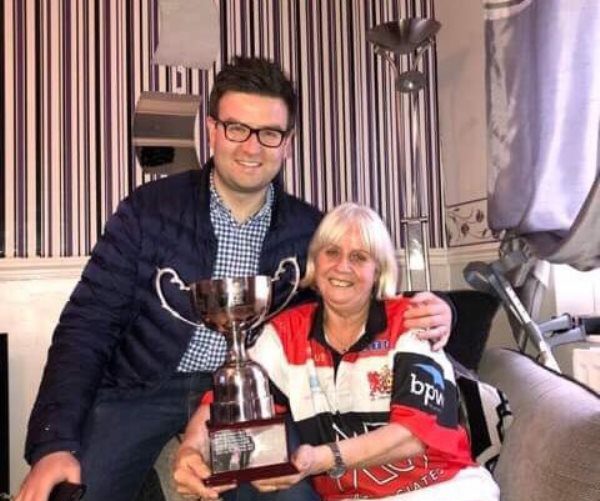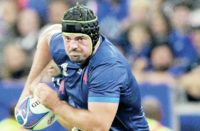(Photo: Getty Images)
By Peter Jackson
During the half-century since his Pontypool debut as a 17-year-old schoolboy, Graham Price could have been forgiven for thinking he had seen and heard it all.
As the tighthead member of the Viet Gwent, he anchored a team forged in the image of the old iron town itself, one whose winning knack outstripped every other club in the British Isles before collapsing in a heap of rubble. Bruce Springsteen's global 1985 hit could have been written about ‘Pooler': Glory Days.
An estimated 20,000 at Pontypool Park for the Wallabies at the start of the Eighties, another 20,000 back there for the All Blacks at the end of the same decade. In between those stellar occasions, four Welsh club titles in five seasons, the last 30 years ago a monument to consistency in the Manchester City league: Played 36, Won 35, Drawn 0, Lost 1. Points for: 1,011. Against: 411.
As close to invincibility as any team could get, closer than in the first of those championship seasons when they played 40 matches and lost twice. And now, glory be, today's Pontypool have come out of the shadows of their renowned predecessors and achieved about the only thing that eluded them – invincibility.
They have won the Welsh National Championship, one tier down from the Premiership, with a record unique among the higher ground of the pyramid: Played 22, Won 22. The level may be some way down among the foothills from the rarefied air breathed by Ray Prosser's teams of yesteryear but it still takes some doing.
It has been done, what's more, with a poignant link the past. Head coach Leighton Jones wouldn't dream of saying so but he has gone one better than his dad, the late Steve ‘Junna' Jones who captained ‘Pooler's' last Welsh champion team in 1988 alongside Price in the front row.
After not far short of 600 matches from the late Sixties to the mid-Nineties, the great Lion, now 66, is still a permanent fixture at Pontypool Park, as club president. “What they have done this season makes me immensely proud,'' he says. “I'm not just the president. I'm an old diehard supporter and many others have stuck with the club through thick and thin.''
The rise of the Pontypool phoenix from the ashes of a calamitous High Court action against the Welsh Rugby Union has been made possible by two people, executive chairman Peter Jeffreys and chief executive Ben Jeffreys. If it hadn't been for father and son, there would have been no Pontypool, as Price readily acknowledges.
“The club is being very well run with a very good team of coaches and players,'' Price says. “That is thanks to the professionalism which the Jeffreys have brought in saving the club from oblivion.''
Jeffreys, senior, cleared the crippling debt incurred in the failed High Court action of 2012 over the club's relegation from the Premiership. “Peter came in just to keep the club going,'' Price says. “He has a great affinity for Pontypool and Ben, always very open-minded, is doing an excellent job of running the club. They hired two buses for the last game at Narberth so a hundred or so supporters went down west free of charge. That's how much they care.''
Jeffreys, junior, 29, is already planning for the ultimate goal of promotion to the Premiership, no matter how convoluted a process that may prove to be given the WRU's decision to reduce the top flight from 16 clubs to 12.
“We've been waiting five years for the opportunity, one denied us for the last three years of ring-fencing,'' Ben says. “The hunger to be the best again next season is incredibly powerful. We are so determined to achieve this.''
Salvaging the club has been ‘a nightmare experience' which has nothing to do with his own fight against depression. “The period after the High Court case was the club's darkest hour,'' he says. “It was a very fraught time, so fraught that we were down to a squad of five players. Five players! The money had gone, there was no guarantee of any stability and about 30 players left for other Premiership clubs.
“We were very new to rugby, an unknown quantity. It took us a good three years to get any grasp of what was required. My father had only just taken the club over when he suffered a stroke a couple of weeks later and was unwell for about six months.
“I had no idea what I was doing. I had never run a rugby club with some strong characters involved. I was hugely out of my depth. I hadn't watched more than five games of rugby before I got involved.
“My dad grew up supporting Pontypool as my grand-father had done. My grandfather passed away two or three months before the High Court case and in clearing the club's debt of about £200,000 my dad was driven by raw emotion.
“We were constantly fighting fires. What we learnt is that we massively underestimated the challenge. There was a pivotal moment when we thought: ‘Do you know what? This is too big a task'.
“We weren't getting success. Our only objective was to get the club back into the Premiership and we probably didn't go about it in the right way in the first few years. We asked ourselves: ‘Should we be doing something else?'
“We decided no. The supporters and the volunteers who had stayed loyal were worth fighting for. This is a club that's still held in high regard by some.
“I'd fallen in love with the rugby club and my dad is now back in love with the club and that's given me a real sense of purpose. A lot of the supporters felt the club had been abandoned by the governing body, in their eyes wronged by the WRU. There is a lot of bitterness and hostility and a lot of work to be done.
“Five years ago the club looked as though it would become extinct. Now we have a future. What the players and coaches have achieved has brought back a lot of nostalgia from the Seventies and Eighties.
“We want people to respect the past but concentrate on a bright future. We are wholly supportive of the plans the WRU have come up with for the league restructure despite the fact that it no longer guarantees automatic promotion if we win the Championship again next season. This is everyone's opportunity to make Welsh club rugby what it ought to be.''
Far from resting on his laurels, Jeffreys is busy taking the championship trophy to the homes of volunteers like Pat Shepphard, house-bound after recent surgery. “We have some amazing people who will be here in all weather,'' Jeffreys says. “Pat personifies why Pontypool is so special to us.
“I'll be taking the trophy to others who are ill like Terry ‘Tiger' Symons. He's in his Eighties and is a link back to when the local Vunipola brothers were kids. ‘Tiger' is typical of the people who make Welsh rugby what it is.''


























